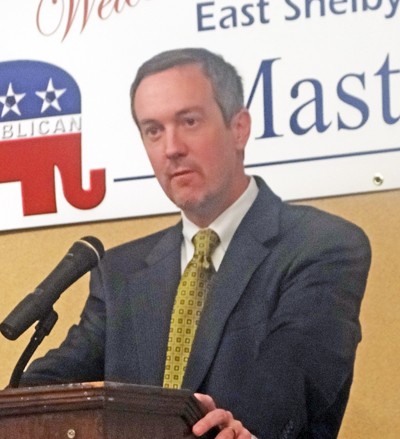Shelby Countians have figured in several post-election moves:
The Rev. Kenneth Whalum Jr., a possible candidate for Memphis mayor next year, isn’t waiting until then to make some waves. Whalum is one of eight plaintiffs from across the state in a suit in federal court designed to invalidate the ‘Yes’ vote seemingly conferred by a majority of voters on Amendment 1, which grants the General Assembly considerable new authority in legislating on abortion matters.
The basis of the suit, which was filed Friday in Nashville, is the language of Article XI, Section 3, of the state Constitution, which states that voters “approve and ratify such amendment or amendments by a majority of all the citizens of the state voting for governor, voting in their favor.”
The plaintiffs, all of whom opposed Amendment 1 and all of whom aver that they cast votes in the governor’s race, say that the constitutional language should be taken literally and that the state has a duty to determine and count only those votes on an amendment question that were cast by persons who also cast votes for governor.
Records compiled by the office of Secretary of State Tre Hargett showed that 32,570 more votes were cast on Amendment 1 than for governor, 1,385,178 as against 1,352,608. The plaintiffs alleged that the disproportion was the direct result of what their attorney Bill Harbison of Nashville, president-elect of the Tennessee Bar Association, said was a strategy by proponents of the amendment of “intentionally abstaining from the governor’s race in an effort to manipulate the numbers in order to pass an amendment” and “a clear violation of [others’] 14th Amendment rights.”
It seems anything but clear to Hargett, a former state representative from Bartlett and a nominal defendant in the suit, along with Governor Bill Haslam, new state Attorney General Herb Slatery, and the seven members of the state Election Commission.
Hargett notes that state election officials have never tried to match votes on amendment questions with ballots cast by the same voters for governor but have measured amendment votes, more abstractly, against a threshold of 50-percent-plus-one of the total votes cast in the governor’s race. “It does not make sense any other way,” he has said.
Also weighing in was Brian Harris, president of Tennessee Right to Life and a coordinator for the Yes on 1 campaign. “Even if you wrongly discount those who may have voted for Amendment 1 but not in the governor’s race, there is still a margin of almost 20,000 votes in favor of the amendment,” said Harris.
Aside from legalities, some complicated mathematical reckonings may figure in this case, due for a first hearing in U.S. District Court in Nashville on January 12th. Meanwhile, legislative advocates of new restrictions on abortion are known to be readying bills in time for the new session of the General Assembly, opening up the same month.
• And speaking of enabling legislation, Senate Majority Leader Mark Norris (R-Collierville) issued a press release on Monday, the eve of Veterans Day, announcing that he and state Representative Rusty Crowe (R-Johnson City) were drafting legislation to allow veterans’ organizations to conduct raffles and games of chance for fund-raising purposes, in accordance with the provisions of Amendment 4, which passed handily in the election.
The amendment expressly grants to 501(c)(19) organizations (veterans’ groups) the same ability to hold such fund-raising affairs as are currently permitted to 501(c)(3) organizations, so long as the veterans’ groups observe the same deadlines for submitting applications to do so — January 31st of a given year for an event scheduled to occur between July 1st of that year and June 30th of the next.
A technical point, even a housekeeping matter, but a necessary one.
Norris, who doubles as chairman of the veterans subcommittee of the Senate State and Local Government Committee, said in the release: “Our legislation will allow this process to move forward and will ensure that the deadline affords these organizations enough time to get their applications in.”
• Hargett and Norris, along with state Senator Brian Kelsey of Germantown, were among Republicans cited this week by The Commercial Appeal‘s veteran Capitol Hill reporter Rick Locker as likely candidates for governor in 2016. Though their ranks have progressively been thinned in recent years by an accelerating statewide shift of political power to the GOP, there are Democratic names involved in gubernatorial speculation as well.
One of them is that of Gordon Ball, who was recently defeated by Republican incumbent Lamar Alexander in this year’s U.S. Senate race.
The wealthy Knoxville lawyer, who made his legal reputation and his fortune suing big-ticket corporations, is meanwhile going through some significant personal changes.
On the plus side, Ball, a graduate of the University of Memphis Law School whose son Tanner is now a student here, told the Flyer last week that he plans to transition at year’s end from his life-long residence in East Tennessee to a residence on Memphis’ Mud Island.
On the down side, Ball also saw his marriage of less than a year to wife Happy Hayes Ball, who accompanied him on his first several campaign trips to Memphis, come to an apparent end. He filed divorce papers last Friday, listing a variety of complaints, including his wife’s alleged unauthorized use of funds from his business account.
Ball’s estranged wife also figured in another possibly unauthorized action that became a campaign issue. It was her removal of a television set and several other furnishings from the couple’s condo in Destin, Florida, that prompted Alabaman Barry Kraselsky, who had purchased the condo from Ball, to sue for breach of contract over the missing items.
That dispute is yet to be adjudicated. Meanwhile, Ball, who has resumed his law practice, says he intends to play golf and take a post-election vacation in Naples.
• An uneasy truce that settled over the Shelby County Commission following a hearing on the body’s rules last week by Chancellor Jim Kyle was in danger of erupting into discord again in this week’s committee sessions.
In a hearing on Thursday, Kyle opted not to rule in the matter of a suit brought against commission Chairman Justin Ford by a group of commission plaintiffs — six Democratic members plus Republican Steve Basar — who allege that Ford violated the body’s rules in arbitrarily keeping a proposed rules change off the commission agenda.
The chancellor told both sides that the commission, in essence, had no rules to break, inasmuch as each elected version of the commission is obliged to set its own rules, and the body elected in August has not yet done so.
Both sides to the dispute had assumed that the commission was bound by rules inherited from previous commissions. The rules change sought by the plaintiffs would have lowered the threshold necessary to enact further rules changes from a two-thirds majority to a simple majority.
Democratic Commissioner Van Turner, one of the plaintiffs in the suit and chairman of the body’s general government committee, which was scheduled to meet on Wednesday, said he intended to bring up the whole matter of commission rules. Meanwhile, said Turner, Kyle’s ruling apparently left the county charter, which calls for a simple majority to decide such matters, as the commission’s sole authority.
Behind all the legal complications is a simple power struggle, pitting the commission’s Democrats and Basar, who was vice-chair in the commission’s last session but lost his bid to become chairman in the current session, versus the other five Republicans plus Ford, a Democrat who gained the chairmanship with GOP support.

 JB
JB